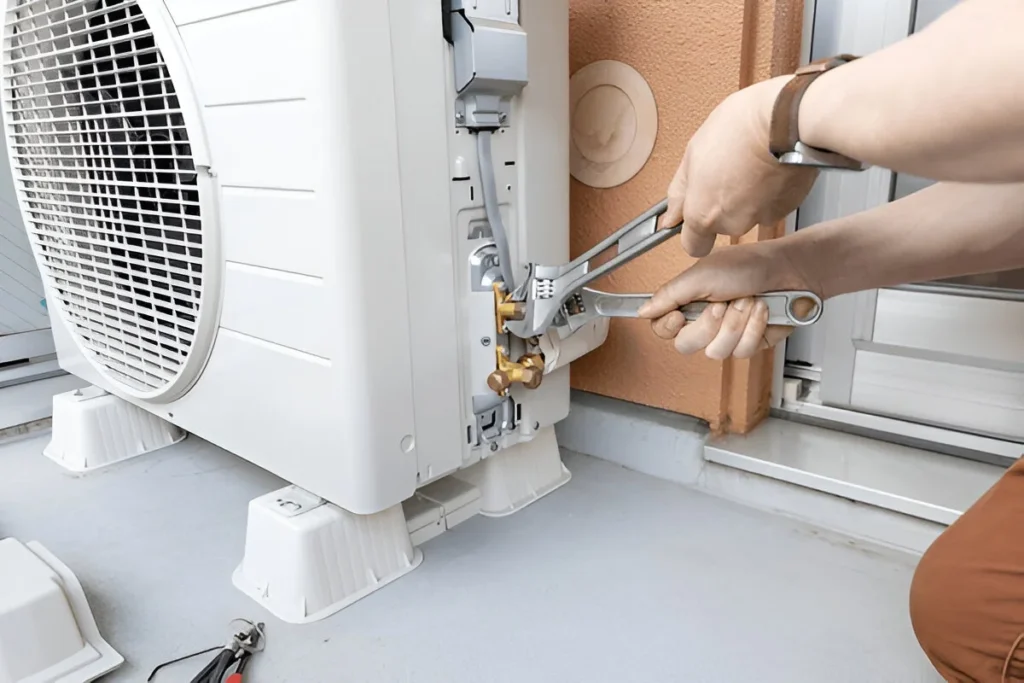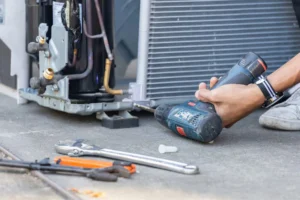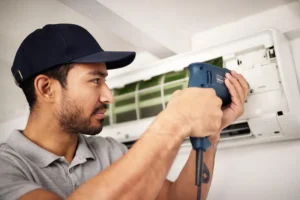
By Admin
Prevent AC gas leakage at home with these expert-backed tips. Learn how early signs, regular checks, and a reputable AC repair service center can help.
Air conditioners, while essential for comfort in India’s long summers, require more than just occasional cleaning to function well. One of the most commonly overlooked yet critical issues is AC gas leakage.
Gas leakage not only weakens the cooling efficiency of your AC but can also spike your electricity bills and, in rare cases, pose health risks. Most households tend to ignore the early signs until the damage becomes expensive or irreversible.

Understanding how to detect and prevent AC gas leakage is the first step toward a cooler, safer, and more energy-efficient home.
The refrigerant gas in your air conditioner—commonly R32, R410A, or older versions like R22—is what allows the AC to cool the air. It absorbs heat from the indoor air and releases it outside via the compressor.
Gas leakage happens when there is a break or fault in the sealed refrigerant system, usually due to:
Corrosion in copper coils
Improper installation
Manufacturing defects
Lack of servicing
Rodent damage or physical mishandling
When this gas starts escaping from the system, your AC struggles to cool, the compressor overheats, and energy consumption increases.
Early detection can save you time, money, and stress. Here are the warning signs that often signal a potential leakage:
Reduced Cooling Efficiency: The AC runs longer but cools poorly.
Hissing or Bubbling Sounds: A clear indicator of a gas escaping through a crack.
Foul Smell or Headaches: Leakage may affect indoor air quality.
Ice Formation on Coils: If the refrigerant is low, ice starts forming around the copper coil.
Unexpected High Electricity Bills: Gas leakage makes your AC work harder, using more power.
Compressor Keeps Tripping: Due to overheating or imbalance in pressure.

While some signs are visible or audible, confirmation often needs a professional diagnosis. That said, there are a few basic methods you can use or request during servicing:
Look around the outdoor and indoor copper tubes and joints for any oil stains or corrosion, which often accompany a leak.
Spray a mixture of soap and water on suspected areas. If bubbles form, it may indicate gas escaping through small holes.
Advanced HVAC technicians use electronic gas leak detectors to accurately locate leaks.
Some service centers add a UV-sensitive dye into the system, which glows at leakage points under ultraviolet light.
Important: Never attempt refrigerant refilling or gas handling yourself. These require proper equipment and safety precautions.
Prevention is not just about reacting to signs—it’s about proactive care. Here’s how you can prevent AC gas leakage at home:
Routine inspections by certified professionals catch corrosion, poor insulation, or faulty parts early on.
Opt for thicker, high-quality copper tubing during installation or repairs. It reduces vulnerability to cracks and corrosion.
Improper bending of copper pipes, excessive tightening, or lack of insulation around joints can lead to future leaks.
Insects and rodents often chew on insulated copper pipes. Install mesh or rodent repellent devices in indoor and outdoor units.
Small hissing noises or minor cooling issues shouldn’t be ignored. Immediate repair can prevent full system failure.
Voltage fluctuations can damage internal components, leading to leakage. A surge protector adds an extra layer of safety.
To prevent AC gas leakage consistently, you need a mix of awareness, timely servicing, and responsible usage. Here’s a quick checklist to follow:
Inspect copper piping annually
Use professional installation services
Clean air filters every 15–20 days
Avoid frequent ON/OFF switching during peak load
Keep outdoor units shaded from direct sun
All of these steps help extend the lifespan of your AC and reduce the chance of a costly refrigerant issue.
For most homeowners, detecting gas leaks or accessing internal parts of an AC unit is neither safe nor feasible. That’s where professional help makes a difference.
A reputed AC repair service center offer:
Advanced leak detection tools
Certified HVAC technicians
Eco-friendly refrigerant handling
Fast turnaround and preventive maintenance plans
Clear documentation for warranty claims
Companies like Rup Air Condition have experience in handling high-pressure refrigerant systems with safety and precision, ensuring your AC runs smoothly through every season.

It’s not life-threatening in small quantities but can affect indoor air quality and cause headaches, eye irritation, or nausea if ignored for long.
No. Refrigerant gases are pressurized and require specialized tools and safety gear. Always contact trained professionals.
A routine annual maintenance check is ideal, or immediately if you notice any cooling issue or unusual sound/smell.
Not immediately. But prolonged leakage can overwork and damage the compressor, one of the costliest components to replace.
If the leak is repaired properly, a refill can last 5–10 years. Without repair, the gas will leak again—often within weeks.
Your air conditioner is more than just a seasonal appliance—it’s an investment in your family’s comfort. But like all machines, it needs care. A gas leak, though seemingly small at first, can lead to poor cooling, system breakdowns, and even health concerns.
By learning how to detect early signs, scheduling regular maintenance, and following simple preventive measures, you can prevent AC gas leakage and prolong your system’s lifespan.
With expert guidance from trusted professionals, you can ensure peace of mind, lower electricity bills, and uninterrupted comfort throughout the year.